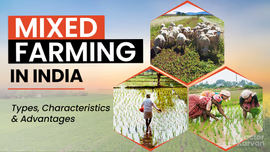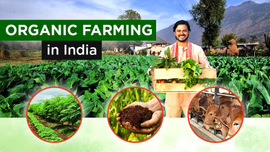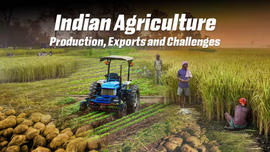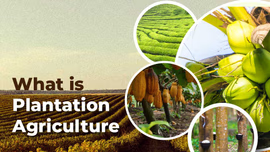Food Security in India: Securing the Future of Millions

Food security refers to the consistent and reliable availability of food to all people throughout the year. The need for food security in India is an important aspect for the nourishment of the country. Today’s blog provides an overview of food security in India, along with the measures needed to maintain a healthy lifestyle.
Table of Contents
- What is meant by “Food Security”?
- What are the Pillars of Food Security?
- Major Challenges in Achieving Food Security in India
- How to Tackle the Challenges associated with Food Security?
- What does the Global Hunger Index Shows about Hunger Situation in India?
- Government Initiatives to Ensure Food Security in India
- Way Forward
What is meant by “Food Security”?
Food security, as defined by the United Nations Committee on World Food Security, means that all people, at all times, have physical, social, and economic access to sufficient, safe, and nutritious food that meets their food preferences and dietary needs for an active and healthy life. Acute food insecurity threatens people’s lives or livelihoods. According to World Food Summit, the eradication of poverty is essential to improve access to food.
What are the Four Pillars of Food Security?
Availability, accessibility, stability and utilization are the major pillars of Food security in India. Let’s discuss them all in more detail:
- Availability of Food: Availability of food means the sufficient amount of good quality food is supplied to all.
- Access to Food: Accessibility refers to a household's ability to have sufficient resources to obtain a balanced diet.
- Utilization: Utilization is the way people use food like eating high nutrient food, preparing it safely, having clean drinking water and proper health care.
- Stability: For stability of food, the population, household or individual must always have access to adequate food at all times.
Major Challenges in Achieving Food Security in India
Over population, climate change & natural disaster, poverty, water scarcity, etc. are some of the major challenges of food security in India. Let’s have a look at each:
- Over Population: The population of India has reached over 1.4 billion, increasing the need for food resources and creating pressure on agricultural production.
- Climate Change: Agricultural activities have been affected by the climate change in India for over decades. The major problems are flood, droughts, extreme temperatures which affect the livestock, fisheries, etc.
- Poverty: As per PIB data, people living below poverty line is 1.46 billion in India. People living in rural areas which is 56.8% of the population, struggle to afford nutritious food.
- Water Scarcity: Rainfall patterns in India are unpredictable which leads to water shortages in many regions which inturn impacts the accessibility and availability of food
- Degradation of Soil: The global food production depends upon the soil. With the degradation due to soil erosion, excessive use of chemical fertilizers, etc. impacts the agricultural productivity.
- Unequal Food Distribution System: There is an unequal distribution of food in India which leads to food crisis.
How to Tackle the Challenges associated with Food Security?
Let’s have a look at the solution to know how food security is ensured in India.
- Sustainable Farming: For ensuring food security in India, we need to promote sustainable farming practices such as agroforestry, regenerative farming, access to more irrigation facilities, integrated pest management, etc. which increases the overall agricultural productivity.
- Modern Technology: Modern technologies like precision agriculture, remote sensing, AI in agriculture and the use of digital farming tools should be adopted to optimize resource use.
- Climate Resilient Practices: Develop heat tolerant crop varieties, and encourage practices such as crop rotation, intercropping, precision irrigation, etc.
- Equal Food Distribution Systems: Strengthen the food distribution networks through better logistics, supply chain management, and market linkages.
What does the Global Hunger Index Shows about Hunger Situation in India?
According to the global hunger index (GHI) 2024, India ranked 105th out of 127 countries with child wasting (underweight for their height) rate, at 18.7%, which is the highest child wasting rate in the report, child stunting (low height for their age) rate is 35.5%, its prevalence of undernourishment is 13.7%; and its under-five mortality rate is 2.9%. India’s 2024 GHI score is 27.3, considered serious according to the GHI Severity of Hunger Scale.
The hunger problem is a serious issue which needs to be resolved as soon as possible to achieve the goals of "Zero Hunger" and "No Poverty". To address this issue, the Government of India has implemented several initiatives and policies.
Government Initiatives to Ensure Food Security in India
The National Food Security Act (NFSA): The National Food Security Act 2013, aims to provide subsidized food grains to 81 crore people in India including 16 crore women, reflecting its commitment to empowering women.
Pradhan Mantri Garib Kalyan Anna Yojana (PMGKAY): This scheme aims to provide free food grains to approximately 81.35 crore beneficiaries. These are the needy people which faced hardships due to economic disruptions caused by the COVID-19 pandemic in the country.
PM POSHAN (POshan SHAkti Nirman) Scheme: PM Poshan is a national scheme which aims to combat hunger and improve education by enhancing nutritional status of children in Government and Government-aided schools. The total budget allocated for this scheme was Rs. 130794.90 crore.
The Antyodaya Anna Yojana (AAY): This scheme ensures food security to the vulnerable sector of the country. The beneficiaries in the scheme are 8.92 crore individuals. Among these beneficiaries, more than 2 crores are women, which addresses the needs of female participants and ensuring their access to critical resources.
Way Forward
The implementation of food security measures is important in addressing the complex challenges of hunger and malnutrition. By increasing agricultural productivity, adopting sustainable farming methods, and refining food distribution systems, India aims to ensure that food is both available and affordable for all its citizens.
Frequently Asked Questions On Food Security in India: Securing the Future of Millions
1. What is meant by food security?
Food security refers to the consistent and reliable availability of food to all people throughout the year.
2. What is the need for food security in India?
Food security in India is important to combat malnutrition, natural calamities and to ensure economic stability.
3. What are the 4 pillars of food security?
Availability, Accessibility, Utilization and Stability are the four pillars of food security.
4. What is the food security Act in India?
The National Food Security Act 2013 aims to provide subsidized food grains to 81 crore people in India.


Related Blogs












